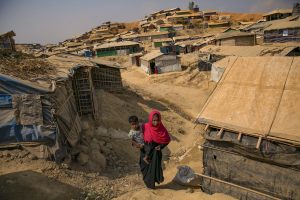For decades, Myanmar’s military has used brutal tactics, including intimidation, harassment, torture and murder, to suppress and silence civilians. The regime’s soldiers are rarely held accountable, and when they are, it is almost always through closed-door military courts whose deliberations are opaque. Consequently, victims of human rights abuses are forced to bear the burden of their own violations, and families and friends of victims are left without adequate redress. Unsurprisingly, their expectations for real justice are vanishingly small.
In recent weeks, despite previous dismissals and denials, the Myanmar military, or Tatmadaw, has offered several admissions of guilt, including its first acknowledgement of “possible wider patterns of violations” against the long-persecuted Rohingya minority in Rakhine State. The announcement follows reports that two Myanmar soldiers have been taken to The Hague after confessing to killing dozens of villagers in the north of Rakhine State and burying them in mass graves. But there is reason to doubt the integrity of the army’s admissions, which come weeks, months, and in some cases years after the crimes were committed. For decades, the Tatmadaw has evaded justice by manipulating domestic accountability mechanisms, including establishing military-led commissions that fail to provide adequate redress to victims or survivors.
To take one recent example, in late June 2020, a 60-year-old farmer named Lone Hsu was killed and a woman was injured by the Myanmar army after soldiers opened fire on a village in northern Shan State. The incident sparked a protest that drew more than 10,000 people in Kyaukme Township, who called for an end to the brutality of the Myanmar military against civilian populations. But rather than respond to the calls of the protest, the military-controlled Tatmadaw True News Information Team announced that it would open a case against three of the organizers for holding the demonstration without permission. The death of Lone Hsu sent shock waves through the community. The villagers were left “burning with anger” after years of military impunity.
At the end of August 2020, the Myanmar army publicly admitted that one of its soldiers was responsible for the death of Lone Hsu. However, the soldier’s confession was filled with discrepancies that attempted to cast doubt on the testimony of witnesses and villagers. The soldier insisted that Lone Hsu was “shot by accident due to a shortcoming in supervision” and that he was killed “in combat.” Military spokesperson Major General Zaw Min Tun added that the platoon commander would be prosecuted since the soldier responsible was killed in action. Sai Tun Win, a parliamentarian for Kyaukme Township, questioned the legitimacy of the response, telling the Shan Herald Agency for News that the confession was “baseless without a transparent investigation,” as the military allegedly did not even speak to local witnesses. There was also no indication as to what charges or punishment the soldier would face, leaving local villagers without redress.
In a separate case, a local Rakhine woman from Rathedaung Township accused three Myanmar soldiers of gang raping her at gunpoint on June 29, 2020. In early July, the military responded by denying the accusation and challenging the claims of the survivor. Then, two months later, the Myanmar army suddenly admitted that its soldiers were in fact responsible. The survivor has spoken out about the attack and through the support of a legal team, has made several calls for harsh sentencing and accountability. Military spokesman Major General Zaw Min Tun said that the perpetrators would not be transferred for a civilian criminal trial, but instead tried through a court-martial where the punishment would be determined under the 1959 Defence Services Act and other laws for civilians. This situation in particular draws attention to the challenges women face when they are violently and often sexually assaulted in conflict.
These are just two incidents among possibly hundreds of similar cases. Yet they speak to flaws in the Myanmar Army’s investigations. It’s difficult to overlook the gaps in the military’s attempts to hold perpetrators accountable, which include initial denials and haphazard explanations that seemingly justify their crimes. Without acknowledging the suffering of the victims and their families during the investigation period, their delayed confessions force survivors to relive their traumas in the pursuit of often partial justice. This also results in a further deterioration of trust in the justice system. It downplays the severity of the crimes committed and undermines the trust local people have in the institutions meant to protect them.
The Myanmar army continues to show little real attempt at accountability. Civil society organizations have condemned the secrecy of military court proceedings as depriving victims of their integrity and right to a fair and transparent trial. This was seen in the case of Naw Mu Naw, a Karen woman who was shot at point blank range in the face multiple times by two Myanmar soldiers. Military commanders said the army would hold the soldiers responsible via a military court martial, and that they would receive the “maximum punishment” for their crimes. But no further details about their sentencing were subsequently made public. This case and others have prompted renewed calls for trials to be held in civilian courts.
The pattern of Tatmadaw denial followed by belated admissions and closed-door trials only furthers the lack of trust civilians have in the Myanmar army. This lack of transparency strips away any genuine sense of accountability. Commanders and the military leadership must work to dismantle the institutionalized culture of impunity which only exacerbates the brokenness of the system. Sham investigations are proven to ruin the integrity of the rule of law. These feigned inquiries only lead to more suffering, more disappointment, and more disillusion in the institutions of justice. Survivors deserve better.
Maggi Quadrini works on human rights for community-based organizations on various projects along the Thailand-Myanmar border.
































